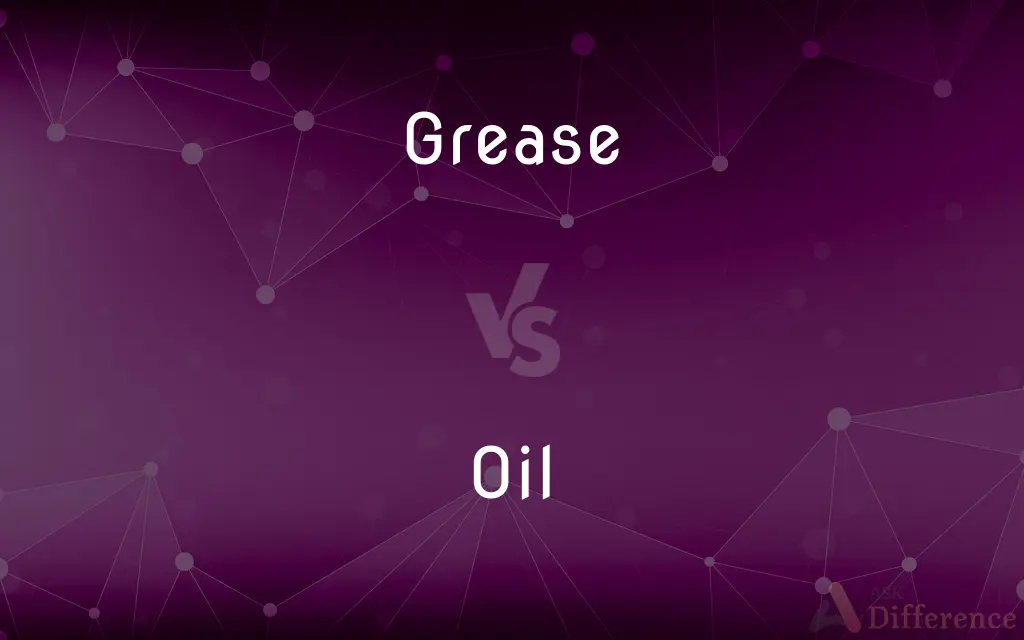Grease vs. Oil — What's the Difference?
Edited by Tayyaba Rehman — By Fiza Rafique — Updated on May 3, 2024
Grease is a semi-solid lubricant composed of oil and a thickener, offering persistent adherence and moisture resistance; oil is a liquid lubricant, excelling in temperature stability and ease of application.

Difference Between Grease and Oil
Table of Contents
ADVERTISEMENT
Key Differences
Grease is typically used in applications where it is crucial to have a lubricant that stays in place and maintains its performance over time, due to its semi-solid form and the presence of thickeners such as lithium soaps. Whereas oil, with its liquid state, is better suited for applications requiring a continuous flow for effective lubrication, such as in engines or turbines.
The composition of grease includes oil but is distinguished by its thickener, which transforms the oil into a semi-solid state that is less likely to leak from bearing seals. On the other hand, oil is a straightforward fluid substance without thickeners, providing smooth and efficient lubrication under various conditions.
Grease is particularly effective in sealing out contaminants and water, making it ideal for heavy-duty machinery and outdoor equipment that might be exposed to harsh conditions. Whereas oil cannot effectively seal components but offers superior cooling properties by transferring heat away from moving parts.
The application method for grease typically involves manual application with a grease gun or brush, catering to specific points in machinery. Oil, however, often requires an automated system for continuous dispensation, such as a pump or drip feeder.
Maintenance routines for grease-lubricated components generally involve less frequent replenishment compared to oil, which may require regular monitoring and topping-up to maintain optimal levels and performance.
ADVERTISEMENT
Comparison Chart
State
Semi-solid
Liquid
Composition
Oil mixed with thickeners (e.g., lithium)
Pure or blended hydrocarbons
Application
Manual, targeted applications
Automated systems, continuous flow
Maintenance
Less frequent, more specific
More frequent, less specific
Ideal Use
Sealing, heavy-duty environments
Cooling, high-speed mechanisms
Compare with Definitions
Grease
Applied using specific tools like grease guns.
He used a grease gun to ensure the bearings were well-lubricated.
Oil
Used in various mechanical systems.
Hydraulic systems use special types of oil for optimal performance.
Grease
A thick, viscous substance used for lubrication.
The mechanic applied grease to the gears to prevent them from rusting.
Oil
Helps in heat dissipation from components.
The transmission oil helps to dissipate heat and reduce wear.
Grease
Lubricant that remains stable under heavy loads.
High-performance grease was used in the factory's heavy machinery.
Oil
A fluid substance for reducing friction.
Oil was added to the engine to enhance its operation.
Grease
Contains additives for enhanced performance.
The grease included additives for high temperature stability.
Oil
Can be synthetic or mineral-based.
Synthetic oil offers better performance at extreme temperatures.
Grease
Often used in sealed systems.
The sealed bearings require grease for long-term lubrication.
Oil
Requires regular replacement or replenishment.
The car's oil needs to be changed every 5000 miles.
Grease
A thick oily substance, especially as used as a lubricant
Axle grease
Oil
An oil is any nonpolar chemical substance that is a viscous liquid at ambient temperatures and is both hydrophobic (does not mix with water, literally "water fearing") and lipophilic (mixes with other oils, literally "fat loving"). Oils have a high carbon and hydrogen content and are usually flammable and surface active.
Grease
Animal fat used or produced in cooking
The kitchen walls were black with grease and filth
Oil
A viscous liquid derived from petroleum, especially for use as a fuel or lubricant.
Grease
Smear or lubricate with grease
A greased baking sheet
Grease a shallow baking dish
Oil
Oil paint
A portrait in oils
Grease
Soft or melted animal fat, especially after rendering.
Oil
Information or facts
Young had some good oil on the Adelaide races
Grease
A thick oil or viscous substance, especially when used as a lubricant.
Oil
Lubricate, coat, or impregnate with oil
A lightly oiled baking tray
Grease
The oily substance present in raw wool; suint.
Oil
Supply with oil as fuel
Attempts should not be made to oil individual tanks too rapidly
Grease
Raw wool that has not been cleansed of this oily substance.
Oil
Any of numerous mineral, vegetable, or synthetic substances or animal or vegetable fats that are generally slippery, combustible, viscous, liquid or liquefiable at room temperatures, soluble in various organic solvents such as ether but not in water, and used in a great variety of products, especially lubricants and fuels.
Grease
(Slang) Something, such as money or influence, that facilitates the attainment of an object or a desire
Accepted some grease to fix the outcome of the race.
Oil
Petroleum.
Grease
To coat, smear, or soil with grease
Greased the pie pan.
Oil
A petroleum derivative, such as a machine oil or lubricant.
Grease
To lubricate with grease.
Oil
A protective or cosmetic liquid applied to the skin or hair.
Grease
To facilitate the progress of.
Oil
Oil paint.
Grease
(Slang) To kill. See Note at greasy.
Oil
A painting done in oil paint.
Grease
Animal fat in a melted or soft state.
Oil
To lubricate, supply, cover, or polish with oil.
Grease
(by extension) Any oily or fatty matter.
Oil
Liquid fat.
Grease
Shorn but not yet cleansed wool.
Oil
Petroleum-based liquid used as fuel or lubricant.
Grease
Inflammation of a horse's heels, also known as scratches or pastern dermatitis.
Oil
Petroleum
Grease
(slang) Money.
Oil
(countable) An oil painting.
Grease
(transitive) To put grease or fat on something, especially in order to lubricate.
Oil
(painting) Oil paint.
I prefer to paint in oil
Grease
To bribe. Category:en:Corruption
Oil
(attributive) Containing oil, conveying oil; intended for or capable of containing oil.
Oil barrel; oil pipe
Grease
To cause to go easily; to facilitate.
Oil
(transitive) To lubricate with oil.
Grease
To perform a landing extraordinarily smoothly.
To my amazement, I greased the landing despite the tricky crosswinds.
Oil
(transitive) To grease with oil for cooking.
Grease
To kill, murder.
Oil
Any one of a great variety of unctuous combustible substances, more viscous than and not miscible with water; as, olive oil, whale oil, rock oil, etc. They are of animal, vegetable, or mineral origin and of varied composition, and they are variously used for food, for solvents, for anointing, lubrication, illumination, etc. By extension, any substance of an oily consistency; as, oil of vitriol.
Grease
(obsolete) To cheat or cozen; to overreach.
Oil
To smear or rub over with oil; to lubricate with oil; to anoint with oil.
Grease
To affect (a horse) with grease, the disease.
Oil
A slippery or viscous liquid or liquefiable substance not miscible with water
Grease
Animal fat, as tallow or lard, especially when in a soft state; oily or unctuous matter of any kind.
Oil
Oil paint used by an artist
Grease
An inflammation of a horse's heels, suspending the ordinary greasy secretion of the part, and producing dryness and scurfiness, followed by cracks, ulceration, and fungous excrescences.
Oil
Any of a group of liquid edible fats that are obtained from plants
Grease
To smear, anoint, or daub, with grease or fat; to lubricate; as, to grease the wheels of a wagon.
Oil
Cover with oil, as if by rubbing;
Oil the wooden surface
Grease
To bribe; to corrupt with presents.
The greased advocate that grinds the poor.
Oil
Administer an oil or ointment to ; often in a religious ceremony of blessing
Grease
To cheat or cozen; to overreach.
Grease
To affect (a horse) with grease, the disease.
Grease
A thick fatty oil (especially one used to lubricate machinery)
Grease
The state of being covered with unclean things
Grease
Lubricate with grease;
Grease the wheels
Common Curiosities
What is grease made of?
Grease is made from oil mixed with thickeners and sometimes additional additives.
What are the main types of oil?
The main types of oil are mineral, synthetic, and blended oils.
Why is oil preferred in automotive engines?
Oil is preferred for its ability to flow freely and cool moving parts effectively.
Where is grease most effectively used?
Grease is most effective in applications that require lubrication to stay in place and seal out contaminants.
What role do additives play in grease and oil?
Additives enhance properties such as temperature resistance, anti-wear, and anti-corrosion in both grease and oil.
Is there a difference in the cost effectiveness of grease versus oil?
Grease may be more cost-effective for applications requiring less frequent application.
How do environmental conditions affect the choice between grease and oil?
Environmental conditions like water exposure or temperature extremes can dictate whether grease or oil is more appropriate.
Can oil be used in all types of machinery?
While oil is versatile, its use depends on the specific requirements and design of the machinery.
How often should oil be replaced in machinery?
Oil replacement intervals depend on the machine type, but typically range from every few months to annually.
Can grease be used as a substitute for oil?
Grease can sometimes substitute oil, but is not suitable for all applications due to its thicker consistency.
What happens if too much grease is applied?
Excess grease can lead to increased resistance and overheating in machinery.
How do temperature extremes affect grease and oil?
Extreme temperatures can cause grease to become too thick or too runny, whereas oil might degrade or vaporize.
How are grease and oil stored to maintain their efficacy?
Both should be stored in sealed containers away from extreme temperatures to maintain their properties.
What are the risks of using the wrong type of oil?
Using the wrong type of oil can lead to inadequate lubrication, increased wear, and potential equipment failure.
What are synthetic greases and how do they differ from conventional greases?
Synthetic greases are made with synthetic oils providing better performance at extreme temperatures and environments.
Share Your Discovery

Previous Comparison
Critique vs. Criticism
Next Comparison
Hummingbird vs. OwlAuthor Spotlight
Written by
Fiza RafiqueFiza Rafique is a skilled content writer at AskDifference.com, where she meticulously refines and enhances written pieces. Drawing from her vast editorial expertise, Fiza ensures clarity, accuracy, and precision in every article. Passionate about language, she continually seeks to elevate the quality of content for readers worldwide.
Edited by
Tayyaba RehmanTayyaba Rehman is a distinguished writer, currently serving as a primary contributor to askdifference.com. As a researcher in semantics and etymology, Tayyaba's passion for the complexity of languages and their distinctions has found a perfect home on the platform. Tayyaba delves into the intricacies of language, distinguishing between commonly confused words and phrases, thereby providing clarity for readers worldwide.
















































